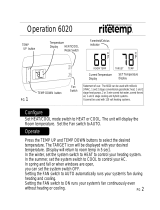
Setup options for how the thermostat will function, along with choosing your
particular system type, are performed using a menu on the display screen.
TO ACCESS THE SETUP MENU: Move the System Mode switch into the OFF
position, and then hold down the EMER button for approximately 5 seconds until
the screen changes. The menu will always start with item #1, and is advanced to
each following item by a single press of the NEXT button. The options for each
item are changed using the UP or DOWN buttons.
ITEM #01 (CLK = CLOCK FORMAT): [12Hr, default] This displays the clock times
using standard AM and PM values. [24Hr] This displays the clock times using the
military-time format (example 22:00 hours, without using AM or PM).
ITEM #02 (TMP = TEMPERATURE SCALE): [F, default] Shows all temperature
values in Fahrenheit. [C] Shows all temperature values Celsius.
ITEM #03 (THERMOSTAT TYPE): [PROG, default] Use this setting for following a
daily program routine. [MAN] This setting omits the program routine and
operates as a manual style non-programmable thermostat. This is very basic and
only shows the room temperature and set temperature on the screen, with no
clock.
ITEM #04 (PERD = PERIOD QUANTITY): [4P, default] Thermostat uses four
periods per day (called MORN, DAY, EVE, and NITE). [2P] The thermostat uses two
periods per day (called DAY and NITE).
ITEM #05 (RCV = EARLY RECOVERY): [OFF, default] Program Set Temperature
values start to occur at exactly the period start times. [ON] Early Recovery
affects how the transition occurs when changing from the NITE to the MORN
period, and when changing from the DAY to the EVE period. The thermostat
calculates how long it takes for your home to recover from a setback on a daily
basis, and turns on ahead of time in order to reach the target set point of the
next upcoming program period by the period’s start time. While in a recovery,
the word “RECOV.” will be shown on the display screen.
ITEM #06 (SYSTEM MODE): [FURN, default] This is for the majority of heating
systems that are not Heat Pumps, such as a gas furnace or hot water boiler. [HP]
Use this setting if you have a Heat Pump system, which uses the outdoor unit as
the primary heat source and may also contain an electric heating element as a
backup heat source. When set to “HP”, ensure that you have also set the
Gas/Electric circuit board option to “ELEC”, as described in the “COMPLETE THE
INSTALL” section.
19
SYSTEM CONFIGURATION AND SETUP OPTIONS:






















